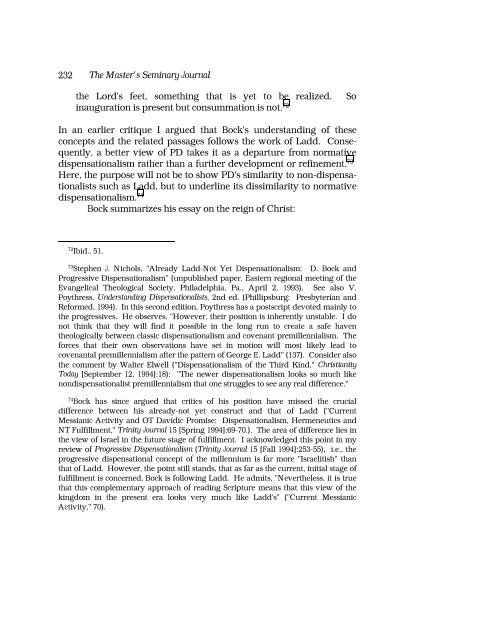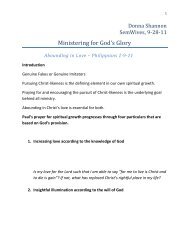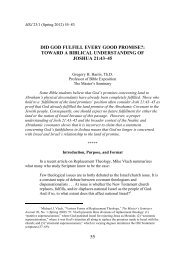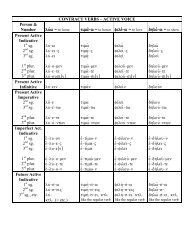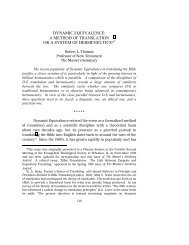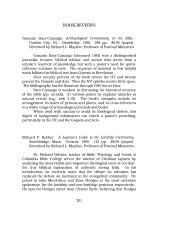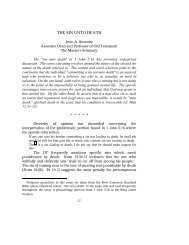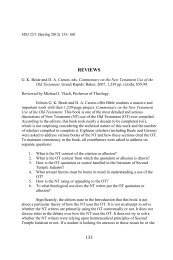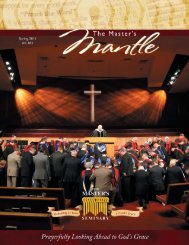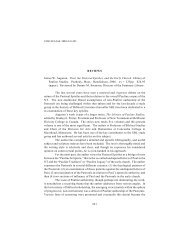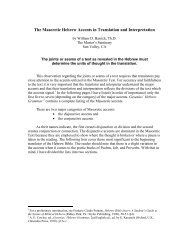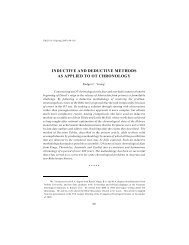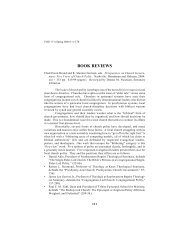The Dispensational View of the Davidic Kingdom - The Master's ...
The Dispensational View of the Davidic Kingdom - The Master's ...
The Dispensational View of the Davidic Kingdom - The Master's ...
Create successful ePaper yourself
Turn your PDF publications into a flip-book with our unique Google optimized e-Paper software.
232 <strong>The</strong> <strong>Master's</strong> Seminary Journal<strong>the</strong> Lord's feet, something that is yet to be realized. Soinauguration is present but consummation is not. 72In an earlier critique I argued that Bock's understanding <strong>of</strong> <strong>the</strong>seconcepts and <strong>the</strong> related passages follows <strong>the</strong> work <strong>of</strong> Ladd. Consequently,a better view <strong>of</strong> PD takes it as a departure from normativedispensationalism ra<strong>the</strong>r than a fur<strong>the</strong>r development or refinement. 73Here, <strong>the</strong> purpose will not be to show PD's similarity to non-dispensationalistssuch as Ladd, but to underline its dissimilarity to normativedispensationalism. 74Bock summarizes his essay on <strong>the</strong> reign <strong>of</strong> Christ:72Ibid., 51.73Stephen J. Nichols, "Already Ladd-Not Yet <strong>Dispensational</strong>ism: D. Bock andProgressive <strong>Dispensational</strong>ism" (unpublished paper, Eastern regional meeting <strong>of</strong> <strong>the</strong>Evangelical <strong>The</strong>ological Society, Philadelphia, Pa., April 2, 1993). See also V.Poythress, Understanding <strong>Dispensational</strong>ists, 2nd ed. (Phillipsburg: Presbyterian andReformed, 1994). In this second edition, Poythress has a postscript devoted mainly to<strong>the</strong> progressives. He observes, "However, <strong>the</strong>ir position is inherently unstable. I donot think that <strong>the</strong>y will find it possible in <strong>the</strong> long run to create a safe haven<strong>the</strong>ologically between classic dispensationalism and covenant premillennialism. <strong>The</strong>forces that <strong>the</strong>ir own observations have set in motion will most likely lead tocovenantal premillennialism after <strong>the</strong> pattern <strong>of</strong> George E. Ladd" (137). Consider also<strong>the</strong> comment by Walter Elwell ("<strong>Dispensational</strong>ism <strong>of</strong> <strong>the</strong> Third Kind," ChristianityToday [September 12, 1994]:18): "<strong>The</strong> newer dispensationalism looks so much likenondispensationalist premillennialism that one struggles to see any real difference."74Bock has since argued that critics <strong>of</strong> his position have missed <strong>the</strong> crucialdifference between his already-not yet construct and that <strong>of</strong> Ladd ("CurrentMessianic Activity and OT <strong>Davidic</strong> Promise: <strong>Dispensational</strong>ism, Hermeneutics andNT Fulfillment," Trinity Journal 15 [Spring 1994]:69-70.). <strong>The</strong> area <strong>of</strong> difference lies in<strong>the</strong> view <strong>of</strong> Israel in <strong>the</strong> future stage <strong>of</strong> fulfillment. I acknowledged this point in myreview <strong>of</strong> Progressive <strong>Dispensational</strong>ism (Trinity Journal 15 [Fall 1994]:253-55), i.e., <strong>the</strong>progressive dispensational concept <strong>of</strong> <strong>the</strong> millennium is far more "Israelitish" thanthat <strong>of</strong> Ladd. However, <strong>the</strong> point still stands, that as far as <strong>the</strong> current, initial stage <strong>of</strong>fulfillment is concerned, Bock is following Ladd. He admits, "Never<strong>the</strong>less, it is truethat this complementary approach <strong>of</strong> reading Scripture means that this view <strong>of</strong> <strong>the</strong>kingdom in <strong>the</strong> present era looks very much like Ladd's" ("Current MessianicActivity," 70).


